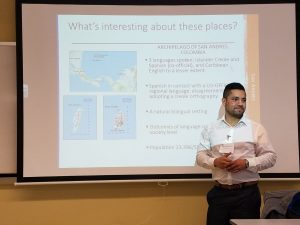Featured Research
Dissertation: Bilingual Rhotics in a Language Contact Scenario
In my dissertation, I investigated a case of language contact in the Caribbean Archipelago of San Andres, a Colombian territory, composed of a set of three islands (i.e. San Andres, Old Providence, and Santa Catalina) located 445 miles from the Caribbean coast of Colombia and 120 miles of Nicaragua. This project integrates two perspectives from which I analyzed contact at the community level, where linguistic and social background measures will provide an analysis of sound variation in the form of rhotics, and at the society level, where a linguistic landscape analysis of the islands will reflect on the cultural and linguistic policies in place.
Voseo in the Linguistic Landscape of Valle de Aburrá, Colombia
Take a very distinguish form in the speech of Paisa people, place it in billboards and signs as a governmental slogan throughout the city, and gain instant electorate identity and support, while other forms of the Paisa identity make their way. This is the case of the alternative second-person form of address Vos in the linguistic landscape of Medellin, Colombia.
Two Minority Linguistic Landscapes in Contact with Spanish, Two Different Language Policies
This study examines the extent to which Islander, the local creole variety spoken in the Archipelago of San Andres, Colombia, and Valenciano (Spain) are represented in the public sphere in comparable domains and settings: beaches and urban centers. A preliminary analysis shows Islander creole and English clustered into specific locations in the islands of Old Providence and San Andres. Conversely, Spanish seems to be the language of choice in the Archipelago. On the other hand, Valenciano has a more stable situation in terms of public display of written signs in tourist and urban settings. Despite having similar language laws, only Valenciano enjoys greater governmental recognition in the public sphere, a situation that might be emulated in the Archipelago. Contrasting these two language contact scenarios could offer potential solutions for the implementation of linguistic policies, and thus, the preservation of the cultural and linguistic heritage of the Islander communities of the Archipelago.
Problem-Based Learning in an Introductory Course on Hispanic Linguistics.
In this study, we investigate the effect of a problem-based teaching methodology in an introductory course on Hispanic linguistics. By comparing two sections of the same class, we aim to determine whether this methodology has any pedagogical improvement, in terms of course grades and students attitudes, over a class with a traditional instructional approach.
Stylistic variation in L2er compositions.
In this study, I examine the stylistic patterns of L2 Spanish learners’ compositions across proficiency levels. After collecting the semester manuscripts of different sections of a composition class, I will conduct a computational analysis through the Stylo R package (https://cran.r-project.org/web/packages/stylo/index.html) to measure the changes in writing styles at two points during the semester (beginning and end), while correlating the proficiency levels of each students. Preliminary measurements have shown the viability of the project and I aim to start the first stages of data analysis on Summer 2019. Depending on the success of this project, future studies will include longitudinal data from a vast array of Spanish classes at the college level.
Future Projects
(2019) (In preparation) Contrastive language policies: a comparison of two minority linguistic landscapes in contact with Spanish.
(2019) (In preparation) Project-based learning in the Hispanic linguistics classroom.
(2019) (In preparation) The Spanish of the Archipelago of San Andres: A comparative variationist study on bilingual rhotics.
(2019) (In preparation) Restrepo Ramos, F. A sociophonetics study on the variable production of Islander creole rhotics.
(Data collected) A sociophonetics study on the variable production of Islander creole rhotics.
(Data collected) Dialectal leveling and /s/ reduction in a contact situation in the Caribbean.
(Data collected) Mixed NP patterns of Spanish loanwords in Islander creole.
(Data collected) The role of inaccusative constructions in the expression of first-person pronominal forms in Spanish learners.
(Data collected) Competing forms of address in Medellin, Colombia.
(Data collected) Changing attitudes towards Voseo in the linguistics landscape of the Valle de Aburrá, Colombia.
(Data collection in progress) A stylometric analysis of Spanish L2ers compositions.
